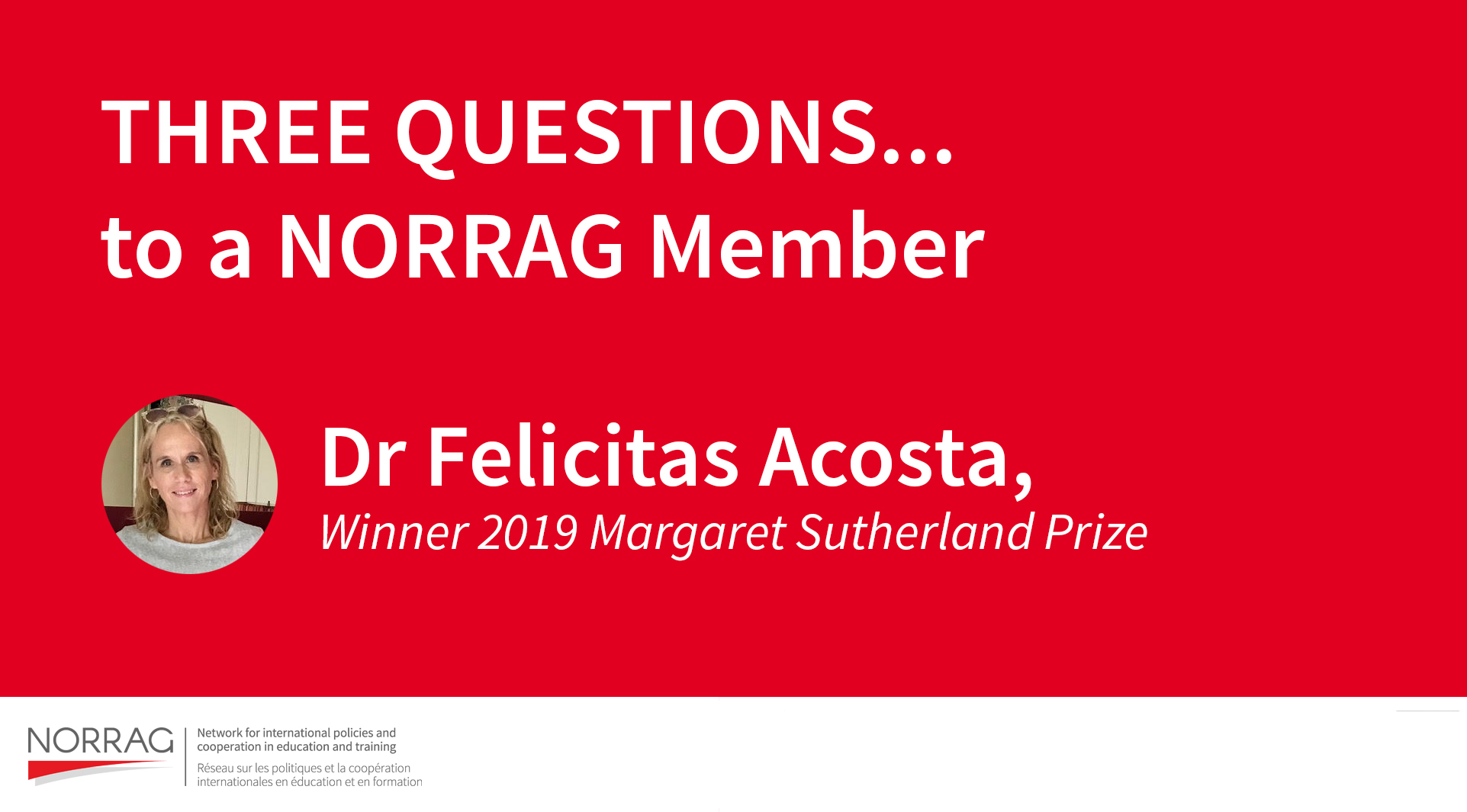Three questions to a NORRAG Member: Dr Felicitas Acosta Awarded 2019 Margaret Sutherland Prize
NORRAG is pleased to announce that Dr Felicitas Acosta – NORRAG Member, member of our editorial board and Innovative Financing for Education project partner – has been awarded the 2019 CESE Women’s Network Margaret Sutherland Prize in Comparative Education for her paper, presented at the CESE Conference in Cyprus in May 2018, “Who is setting the agenda? OECD, PISA, and educational governance in the countries of the Southern Cone.”
We reached out to Dr Acosta and asked her to participate in our “three questions to a member” series to find out more about the prize, her work and connection with NORRAG. In awarding the prize, the jury praised her work as a fine example of scholarship in comparative education, highlighting the clarity of the writing, its good organisation, its handling of details and overall its compelling and original argumentation that advances scholarship in the field.
Dr Acosta, congratulations on winning this year’s CESE Women’s Network Margaret Sutherland Prize. Can you tell us more about it?
The Margaret Sutherland Prize is awarded by the Comparative Education Society in Europe (CESE), specifically by the CESE Women’s Network. It is granted to an outstanding paper in comparative education written by a woman scholar in an early or mid-career phase of her work and initially presented at a CESE conference. I presented the selected paper during the last CESE conference at the University of Cyprus in May 2018 titled “Identities and Education. Comparative Perspectives in an Age of Crisis”, specifically to the Governance, Nation State and the New Transnational Order working group coordinated by Nelli Piattoeva (University of Tampere) and Elaine Unterhalter (UCL, London). Both Elaine Unterhalter and, specially, Professor Bob Cowen encouraged me to participate. The Prize comes with a certificate, a waiving of the registration fee for the subsequent CESE conference and a statuette of the “Owl of Athena” that symbolises the spirit of Margaret Sutherland. “The Owl” is passed on through the generations, from one recipient to the next.
Tell us more about the paper, the methodology you used, and in what way was it an innovative approach?
The paper is entitled “Who is setting the agenda? OECD, PISA, and educational governance in the countries of the Southern Cone”. It is the result of research work that started within ‘The Global History of the OECD’ project, coordinated by Professor Christian Ydesen (University of Aalborg), who had invited me to participate in the project. The topic was relatively new to me since I had not taken previously OECD and PISA as specific objects of study.
The paper explores the relations established by Argentina, Uruguay and Chile with the OECD in new ways and how they have implemented PISA tests. It provides a historical perspective on the diverse relations of these three countries and poses questions on how the forms of the state and belonging to a global policy club may provide insights into who sets the agenda for education reform in the Southern Cone.
The challenge for me was to contribute with a perspective from the Global South countries from South America, which are not usually considered by the existing literature. Based on extensive bibliography, I also intended to offer a different reading of the use made of PISA tests and the relation with the OECD that would allow a better understanding of the particular characteristics of the cases under study. Articulating specific historical pathways and transnationally circulating discourses and practices was critical for the study. We will share part of these concerns with colleagues from Finland, Brazil, Spain, Paraguay and Hong Kong during CIES 2020 sessions. I have positive expectations about this line of study.
What is next for you in your research and what is upcoming, also in relation to NORRAG?
Regarding research, I have started to explore the assessment and inclusion agendas, which find a reference in different international organisations such as OECD and UNESCO. These studies are set within the framework of an international project also designed and coordinated by Christian Ydesen. I intend to relate this transnational concern with the case of Argentina, especially considering secondary education. Argentina has a long-standing tradition of inclusion at the secondary education level but with a low-intensity schooling experience.
In line with the above, I am carrying out research into the structures of secondary education in Latin America and their relation with historical processes of social and educational segmentation. This research is also linked to my work at the university although it is promoted by IIEP UNESCO Buenos Aires.
Finally, and with regard to NORRAG, participating in the Innovative Financing for Education project led by Gita Steiner-Khamsi and Arushi Terway has enabled me to approach an area of study that was new to me and about which I am gaining considerable knowledge. Last October we presented some of the results at the swissuniversities Development and Cooperation Network (SUDAC) annual conference as the project is partly financed by SUDAC. The subject really attracted much attention from the participants. And, of course, I plan to produce the new Spanish edition of NSI in 2020 (editor’s note: NSI 04 New Philanthropy, disruption, and other debatable trends).
Biographical note:
Felicitas Acosta is a researcher and Professor of Comparative Education, History of Education and Educational Foundations at Universidad Nacional de General Sarmiento, Argentina. Her research interests focus on the expansion of schooling from a comparative and historical perspective and international educational policies. She has specialized in the study of secondary education in Europe and Latin America. At present, her research interests also include international standardized assessments and innovative financing for education. She has been an International consultant for OEI/EUROsociAL, IIEP UNESCO and UNICEF. She is the current editor of NORRAG NSI Spanish edition.

